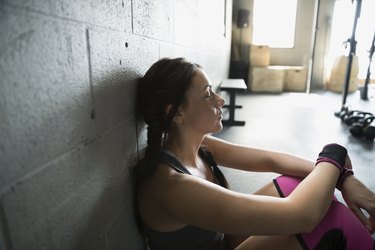
Fatigue and lightheadedness while exercising are contraindications to exercise. The effort you put into your exercise session may not pay off when you experience these symptoms. They may indicate overexertion or injury.
Fatigue and lightheadedness may also be signs of serious or life threatening health conditions. Discuss your symptoms with your doctor and keep a journal or log that records information about your symptoms, workout, diet and stressors in your life to determine potential causes and prevention strategies.
Video of the Day
Video of the Day
Dizziness and Fatigue After Exercise
Potential causes of fatigue and lightheadedness while exercising include dehydration, heat exhaustion and hyponatremia. Dehydration may cause fatigue and lightheadedness, because your body loses fluids through sweat while you exercise. Your body becomes dehydrated if you lose more fluids than you drink.
Dehydration is a precursor to more serious conditions such as heat exhaustion, heat cramps and heat stroke says Mayo Clinic. Strenuous exercise sessions can lead to heat exhaustion, particularly in hot or humid environments. Heat exhaustion is preventable but may lead to heat stroke and threaten your life, if you do not get immediate treatment.
Your body also loses sodium through your sweat during exercise, and you may develop hyponatremia if you replace too much sweat with fluids that do not contain enough sodium. Eating too little, insufficient recovery or exercising too soon after a meal can also cause fatigue and lightheadedness.
Change to Low Intensity
Fatigue and lightheadedness may result from exercising too much says ACE Fitness. You may safely perform low to moderate aerobic exercise every day, but intense aerobic exercise or weightlifting may require two or more days rest. Low to moderate aerobic exercise brings your pulse within 50 to 70 percent of your maximum heart rate.
Calculate your maximum heart rate by subtracting your age from 220, and allow your body to rest for a day for any aerobic exercise that exceeds that range. Target different muscle groups on different days for weightlifting exercise, and give each muscle group at least one or two days to recover.
Drink Enough Water
Drinking water before, during and after your workout can help you avoid fatigue and lightheadedness due to dehydration recommends the Academy of Nutrition and Dietetics. The American Academy of Family Physicians recommends drinking 17 to 20 oz. of water a couple hours before exercise, 8 oz. of water 30 minutes before warming up and 7 to 10 oz. of water every 10 to 20 minutes during exercise. Drink 8 oz. of water within 30 minutes after you finish exercising.
Read more: Why Drink Water After Exercising?
Meal Timing and Digestion
Digestion can interfere with your exercise by causing fatigue and lightheadedness. Your central nervous system redirects blood flow by constricting vessels that support digestion and dilating vessels in working muscles, if you exercise during digestion. This slows the digestive process. Fatigue, lightheadedness, dizziness or nausea may result from retaining food in your intestine too long. You can avoid this condition by giving your body at least two hours to digest food before exercising.
Calories for Fuel
You must eat enough calories to provide fuel for exercise. Eating too few calories can produce fatigue and lightheadedness. The symptoms can result from reducing your caloric intake too far below the amount required to maintain your weight or below the minimum recommended intake. The lowest recommended intake per day is 1,200 calories for women and 1,500 calories for men according to Harvard Health. Adding your resting metabolic rate to the number of calories you expend during exercise can help you determine how many calories you need to maintain your weight.
Was this article helpful?
150 Characters Max
0/150
Thank you for sharing!
Thank you for your feedback!